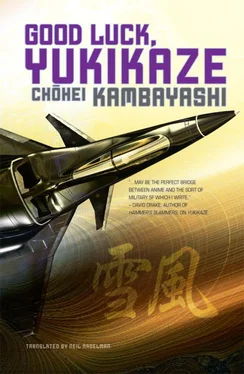It’s the story of a fighter plane and its pilot and their battle with an enemy on an alien world. But that mainly serves as a specialized stage, merely a background for a drama of society and humans. Amidst the extreme circumstances of war, it paints a picture of a hero joined to a cool piece of mecha and destiny in a symbiotic relationship that could almost be called fetishistic. However, what’s depicted here isn’t a war in the usual sense. (The book itself refers to it as a “struggle for existence.”) It’s full of detailed descriptions of the mecha served to wow the fans, but that’s not the sole source of this book’s appeal. Herein lie the major themes of what is intelligence? What is communication? And the author pursues those themes repeatedly. It’s loaded with deep speculation about the perception of the self and others, an ultimate example of SF as speculative fiction.
WARNING! The following contains spoilers about the previous work, Yukikaze . Those who have not read it yet, beware. As this book is a sequel, you are strongly urged to read Yukikaze before proceeding.
A THREE-KILOMETER-WIDE COLUMN of mist appears on a point on the Ross Ice Shelf in Antarctica. This is the “Passageway,” and through this hyperspace corridor fly an alien intelligence known as the JAM to invade Earth. However, the human race form an Earth Defense Organization and begin their counterattack. On the other side of the Passageway lies the mysterious planet Faery. Humanity establishes bases there, and this begins a long war with the JAM that is to last thirty years.
The main actor in the war is the Faery Air Force (FAF). Evolving from our current jet fighter planes, the Sylphid fighter with an advanced electronic brain is deployed at the bases on Faery. In addition, an organization charged with reconnaissance and intelligence gathering is established within the FAF: the Special Air Force (SAF), who deploy an improved version of the Sylphid with more powerful computers known as the Super Sylph. The Super Sylph’s artificial intelligence, along with the base’s tactical and strategic computers, possess individual consciousness, making them sapient life-forms that exist along with the humans.
The SAF’s mission is to survive and bring their data back to base, and they are prepared to let their comrades die if necessary to achieve that end. For that reason, the pilots must be callous and coldhearted. In a sense, they require personalities that put them at odds with most ordinary human beings. Rather than human beings, they are more like parts of their fighter planes, organic combat computers that are a part of the Super Sylph.
The previous novel told the story of an SAF Super Sylph named Yukikaze and her pilot, Rei Fukai. As befitting an SAF member, he has trouble communicating with people, only really able to relate to his commander, Major Booker, and Yukikaze. But as he fights, he gradually begins to face the meaning of the war he’s fighting. Quite simply, he comes to believe that the war isn’t a battle between mankind and the JAM, but one between the aliens and the computers that mankind has built. What meaning could human existence have in such a war?
This question also seems to be an important issue for the JAM. They seem unable to understand what humans are, and subtly change their tactics in order to determine the answer to that question. The previous novel showed that they’d reached the point of being able to duplicate human beings. Rei is captured by them, and from this vital story point, the sequel develops.
At the end of the previous novel, Yukikaze is destroyed, and her core data that could be called her consciousness is then transferred into a state-of-the-art fighter plane called the FRX00. And so begins this book, the story of a reborn Yukikaze and Rei Fukai.
There is a debate about whether planes should be manned or unmanned. On the one hand is the argument that the human element is wasteful and unnecessary in extreme situations. A manned fighter requires all sorts of limitations and equipment to preserve the life of the human, preventing the machine from achieving maximum performance. In terms of cost-effectiveness, it’s a disadvantage. For example, for the scientific investigation of space, it’s much more efficient to send out lots of unmanned space probes than to send one manned spacecraft. On the other hand, there’s the argument that, when things go wrong, there’s ultimately no substitute for human judgment. This is acknowledged as a realistic point of view, based on the current limitations of robots and computers. However, our current feeling that we can’t just leave things to machines is very likely born of a desire by humans (which is to say ourselves) to be involved with things. So, even assuming that artificial intelligence is developed to a very advanced level, this argument will most likely continue to be made. In this book, Rei Fukai argues that “humans are necessary in this war.” But it isn’t because human judgment is more correct than the machines, but because they can behave illogically in a way that the JAM can’t understand. Once the enemy JAM are able to understand them, the humans will be defeated. That’s because this war is essentially about information. Information, communication, interfaces. Those are the central themes of this story.
THE JAM MAY be what Philip K. Dick called androids, or simulacra. Although very similar, they are fundamentally alien. Humans and machine intelligences like Yukikaze are alien to each other, but there is the possibility of understanding and comprehension between them (though this may actually just be an illusion on the part of the humans. Still, Rei is able to trust Yukikaze). However, the JAM are unable to understand our hearts. If they took a Turing Test, they’d likely be disqualified at some point. That’s because the nature of their existence makes communication with them impossible. From their statement “I am that I am,” you get the feeling that they are hopelessly alien. Even if they are able to simulate humans, they are beings who have no way to comprehend them.
Stanislaw Lem’s The Invincible presents a battle with an alien enemy that humans are unable to communicate with. Yet Lem’s enemies are so alien that communication is unthinkable from the very start. In Chōhei Kambayashi’s work, as alien as these beings are, there still exists a type of interface between them. Namely, the interface of words. Machine intelligences like Yukikaze straddle the gap between the humans and the JAM, able to translate between them at some level (a level just short of mutual understanding, but not overly emphasizing the alienness of the JAM either). And in Kambayashi’s work, even as you realize you can’t understand the enemy just when you think you have a handle on them, there also exists a sense of humor. Even the characters aren’t flustered by the one-sided relationship with their opponents (though to be fair, you can’t call them normal people).
Despite being a story that deals with deep themes, presents characters lacking in humanity, and is written in sparse prose drained of emotion, when you read this book as entertainment, seeing these sorts of characters being able to deal with their world with a vague sense of humor is a major point. We’re able to empathize with them and with Yukikaze. Hurtling through the skies of planet Faery, reading Yukikaze’s thoughts as a brief string of characters on the cockpit display, we can feel the tension of the fierce battle she fights. It is the act of communication we call “reading.”
As I write this sentence now, a real war is going on in a different reality separated from our day-to-day life. It is accompanied by a feeling of unreality, like the war on the planet Faery. We can’t treat the terrorists of reality like the JAM. However, looking at the root of this war as a failure of communication, I can’t help but think about the relationship between it and this book. Though Rei Fukai would likely look at this war between his fellow humans and simply say, “Not my problem.”
Читать дальше












